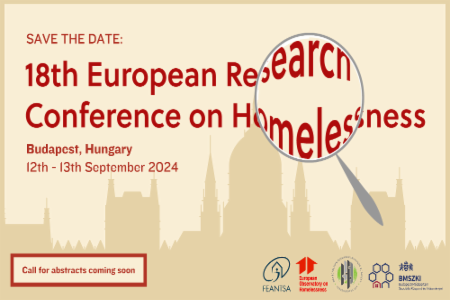Homelessness is a health issue:
A truly comprehensive European approach to mental health must consider the needs and access of people experiencing homelessness
Download the statement here [PDF]
On the 7th of June 2023, the European Commission (EC) launched a Communication to the European Parliament, the Council, the European Economic and Social Committee and the Committee of the Regions on a comprehensive approach to mental health. This initiative marks a turning point in the way mental health is addressed in the EU; the EC referring to it as the beginning of a new strategic approach to mental health. It aims to put mental health on par with physical, in a cross-sectoral manner which goes beyond health policy.
FEANTSA strongly believes that more consideration should be given to the situation of marginalised communities in the recent Communication, and we call for targeted measures formulated under a flagship initiative that should work towards ensuring that people in vulnerable situations, including those experiencing homelessness as well as LGTBI people, people who use drugs, prisoners, sex workers and undocumented migrants, have access to mental health care. As the needs of, and subsequently successful support measures for, marginalised groups vary, such a flagship initiative should be developed and implemented in close collaboration with organisations representing people in marginalised communities in Europe. For developing adequate measures to support people experiencing homelessness we formulate the following recommendations:
a) Recognise the impact that homelessness has on people’s mental health. The trauma of not having a safe shelter has a huge impact on people’s mental wellbeing and should be addressed consequently.
b) Improve mental health care and follow up as a form of preventing homelessness (for example, proper discharge from mental health care facilities to avoid discharge into homelessness).
c) Learn from the COVID-19 pandemic lessons – this period has greatly affected people experiencing homelessness, in particular their mental health.
d) Promote and advocate for the implementation of ‘Housing first’ as a measure to improve people’s health situation.
e) Developing mobile/outreach mental health services.
f) Support health services to become more inclusive and develop knowledge about discrimination against/stigma attached to people experiencing homelessness who may feel pre-judged and rejected by the health systems.
g) Address specific challenges among people experiencing homelessness – within the homeless population certain groups encounter specific inequalities in accessing health services, and their mental health is hugely impacted by the intersection of homelessness and additional factors.
Finally, as the next steps are taken in the development of the proposed measures under the comprehensive approach to mental health, we call on the EC and Member States to include measures on homelessness across the flagship initiatives put forward.





